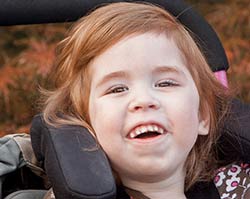 Claire Winterburn had been sick during the holiday season last year, and her parents, Rachael and Ron, were worried. Cerebral palsy makes the 4-year-old prone to frequent respiratory infections, but this time was different. She wasn’t getting better.
Claire Winterburn had been sick during the holiday season last year, and her parents, Rachael and Ron, were worried. Cerebral palsy makes the 4-year-old prone to frequent respiratory infections, but this time was different. She wasn’t getting better.
“Claire doesn’t have the natural instinct to swallow and clear her airways,” says Rachael. “When she gets sick, it becomes even harder for her to breathe. And I just knew something was very wrong.”
Trusting her instincts, Rachael took Claire to CHKD Medical Group’s Coastal Pediatrics in Elizabeth City the day after Christmas. Her pediatrician, Dr. Daniel Robinson, examined Claire and immediately recognized she was very ill – her oxygen levels were dangerously low, and her breathing rate was elevated.
“He told me she had to go to CHKD immediately,” says Rachael. But Dr. Robinson told Rachael and Ron that a ride in the family car was too risky. Instead, he made a quick call to CHKD requesting a transport unit to take Claire to the hospital.
CHKD transports are state-of-the-art mobile intensive care units specially designed to meet the emergency needs of children throughout CHKD’s extended service area. Two CHKD teams are in place 24 hours a day, 365 days a year, to transport children from all hospitals and pediatric practices in southeastern Virginia, northeastern North Carolina and Virginia’s Eastern Shore. On average, CHKD transport teams make more than 1,200 trips a year. A majority of those transports bring newborns to CHKD’s neonatal intensive care unit (NICU). Others call CHKD for children who are seriously ill, like Claire, and need the specialized pediatric care only available at CHKD.
“When I send a child to CHKD, I have to decide if the child is stable enough to get there by car or if they may get worse on the way,” says Dr. Robinson. “The transport team truly offers mobile intensive care – they can do almost anything an emergency room can do, but they do it inside a vehicle on the way to the hospital.
“Claire was obviously extremely ill,” he continues. “I knew that getting her to CHKD as quickly as possible was the best thing for her.”
During the call to CHKD, Dr. Robinson gave the hospital a synopsis of Claire’s condition. The information was then relayed to the transport team on duty, who called Dr. Robinson back to get additional details and provided a general timetable for arrival. Within the hour, the transport unit arrived at Coastal Pediatrics to pick up Claire, and Dr. Robinson had her paperwork ready to pass along to the team.
Each transport team consists of a registered nurse and a registered respiratory therapist with pediatric critical care experience, as well as a certified paramedic. Upon arrival, the team’s first response is to stabilize patients before transporting them to the hospital.
“Claire was sicker than we expected when we arrived,” says Chris Johnson, the registered nurse on the transport team that day. Along with team members Lori Kaliher, a respiratory therapist, and -Israel Medina, the team’s paramedic, Chris moved Claire from the doctor’s office to the back of the transport unit, started an IV and began antibiotics to stabilize her.
“The theory behind the transport is that we’re bringing the hospital to our patient,” explains Chris. “The equipment and supplies on the transport are especially designed for kids, and if a child’s condition changes en route to the hospital, we are fully capable of addressing any issues that occur.”
Communication is also a critical part of the transport team’s job. “We are up-front with parents. We let them know what we are doing and any treatments we’re planning. During the intensity of the moment, parents often express relief to have us there,” says Chris.
Rachael admits that she and Ron were anxious about leaving Claire. “I was terrified, but the transport team told me exactly what would happen from the minute Claire left my arms,” says Rachael. “They had everything they needed for her at their fingertips, and we watched them stabilize her right there in the back of the transport unit.”
The transport team’s compassion and confidence comforted the couple as they kissed their daughter goodbye and prepared to follow the unit to CHKD in Norfolk. “The transport team was phenomenal,” says Rachael. “They even called us during the ride to let us know Claire was okay.”
Once she arrived, Claire was taken to the pediatric intensive care unit. Her condition was so serious that a breathing tube was immediately inserted. She was diagnosed with a severe case of pneumonia and spent three weeks in the hospital before she was finally well enough to go home.
“She was a very sick little girl,” Rachael says. She and Ron feel grateful for the transport team that cared for Claire on the way to CHKD. “It really makes a statement about how CHKD is so child-friendly. When you have a child with special needs, you really appreciate the extra effort everyone makes to treat a child and their parents with special care. It makes a difference.”
Dr. Robinson agrees. “The CHKD transport is a wonderful resource for regional pediatricians and hospitals. It almost feels like the cavalry is arriving when they pull up.”
Dr.Robinson practices with CHKD Medical Group’s Coastal Pediatrics.